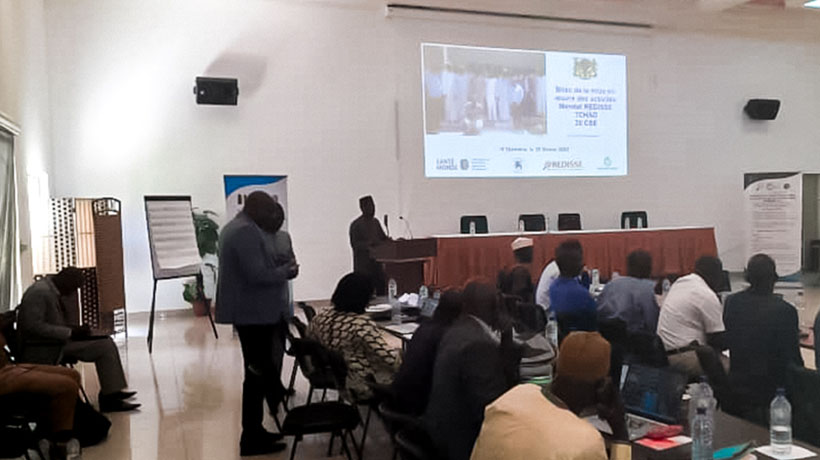News
Strengthening epidemiological surveillance in Chad: closure of the REDISSE project conducted in partnership with Santé Monde
Launched in March 2023, the REDISSE IV project to set up 20 epidemiological surveillance centers (ESCs), led by Santé Monde and the Mérieux Foundation, concluded with a reporting workshop held in N’Djamena on February 28, 2024, with the active participation of the national authorities. The REDISSE project has successfully strengthened the epidemiological surveillance system and the fight against epidemics and other major public health events.

The 88 attendees at the reporting workshop included central and regional heads of department, technical and financial partners such as the World Bank and the World Health Organization (WHO), and staff from the 20 district epidemiological surveillance centers (ESCs). In the presence of the Deputy Secretary General of the Ministry of Public Health and Prevention, the Deputy Coordinator of the REDISSE IV Chad project, the project’s Public Health Expert, the Director General of Medication, Pharmacy and Laboratories, and the Santé Monde Project Manager, the workshop was an opportunity to report on the global results of Santé Monde and the Mérieux Foundation’s support for strengthening the epidemiological surveillance system. The presentation concentrated primarily on the support provided by the institutions and the results achieved, the assessment of how well the ESCs are operating, and the difficulties and challenges encountered throughout the project. The participants were able to learn lessons and formulate recommendations with a view to optimizing the long-term operation of the ESCs. The discussions between the stakeholders highlighted the success of the project in ensuring the optimum functioning of the epidemiological surveillance centers, thanks in particular to the productive collaboration between the laboratories and the surveillance teams.
Following a review of the 20 ESCs, the organization of two training workshops for medical biology laboratory staff, two formative supervisions, the delivery of laboratory and computer equipment coupled with laboratory management software (LabBook), and training for several staff members in first-level preventive and corrective maintenance at the Ecole Polytechnique d’Abomey Calavi in Cotonou, the actions taken during this year of deployment led to the operational establishment of 20 ESCs to improve the collection, processing, and analysis of epidemiological surveillance data. In addition, these initiatives enabled an assessment of the continuing performance of the ESCs and a strengthening of collaboration between the various players through active networking. These efforts have reinforced the skills and resources needed to respond to health challenges, contributing to an overall improvement in public health.
About REDISSE Chad
To prevent or respond appropriately to new epidemic phenomena and other public health emergencies, the World Bank supports the Regional Disease Surveillance Systems Enhancement (REDISSE) program in West and Central Africa. The program aims to reinforce regional and national surveillance and response systems.
Against this backdrop, Chad’s Ministry of Public Health and Prevention (MSPP) commissioned Santé Monde and the Mérieux Foundation to reinforce the country’s capacity in the area of disease surveillance by providing training and computer equipment for the 20 epidemiological surveillance centers (ESCs). The initiative also involved improving the skills of laboratory and surveillance staff in collaboration with the national health authorities at all levels of the health system. The goal was to improve data collection and analysis in order to produce high-quality reports, making it easier to take informed decisions about epidemic management.
